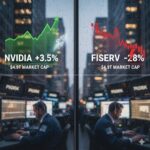The latest wave of Q3 earnings reports has sent a genuine jolt through the market, dividing winners and losers in a landscape increasingly defined by AI spending and regulatory shadows in healthcare. For every tech giant like Alphabet punching above its weight, there was a major chain like CVS or a specialty chemical maker like FMC facing a brutal reckoning. It’s a classic earnings season—unpredictable, messy, and forcing investors to think fast.
Tech Giants Bet Big on AI, Investors Flitch
Big Tech’s twin titans, Alphabet and Microsoft, delivered the kind of results that usually send stock indexes skyward. Alphabet, the search behemoth, saw its shares gain 4% after an adjusted quarterly profit of $3.10 per share—a solid beat over the $2.33 analysts expected. Much of the lift came from robust revenue streams in Google Cloud and YouTube advertising.
Microsoft, despite posting strong fiscal first-quarter results—its Azure cloud revenue soared 40%—saw its stock dip 3%. Why the contradiction? Finance Chief Amy Hood’s caution that capital spending would accelerate this fiscal year spooked some traders. The market is nervous about how much it costs to build the AI infrastructure of tomorrow.
“The Street’s initial reaction to Microsoft is a knee-jerk one. It tells you they’re hyper-focused on the expense line,” said Cynthia Lew, Chief Analyst at Zenith Capital. “But these capex hikes are the cost of admission for the next decade of AI dominance. Alphabet is showing strong monetization now; Microsoft’s investment is about locking in the future.”
The most dramatic reversal, however, belonged to Meta Platforms. The Instagram parent plunged over 9% after raising its own capital expenditure forecast, specifically upping its AI investment spending to between $70 billion and $72 billion. That massive outlay totally overshadowed an otherwise decent quarter on earnings and revenue.
Healthcare Caught in a Cost Squeeze
The pharmaceutical and health service sectors saw a major split. Anti-obesity drugmaker Eli Lilly was a clear standout. Its shares rose 3.5% after third-quarter earnings of $7.02 per share easily surpassed the $5.69 consensus, pushing the company to hike its full-year revenue outlook. Similarly, Bristol-Myers Squibb gained 5% on strong results, nudging up the low end of its full-year guidance.
Conversely, the pharmacy benefit management (PBM) space is clearly under pressure. CVS stock tumbled more than 4% after management used the ominous term “cautious outlook” on its Medicaid business. This comes as the PBM is already wrestling with the costly, complex transition of contracts to drug-level pricing, a move expected to lead to “modestly lower growth” in its Caremark division for the next few years.
Not to be outdone, health insurer Cigna also saw its shares slide after management signaled that its own PBM division would face margin pressure. It seems the industry’s cash cow is starting to be milked a little less efficiently.
Retail and Industrials: Misses Become Mayhem
The retail and industrial corners of the market delivered a series of painful misses. For the third straight quarter, Chipotle Mexican Grill cut its same-store sales forecast, sending the stock spiraling down more than 15%. A simple decline in foot traffic was the culprit—a real concern for the quick-service category. Meanwhile, organic grocer Sprouts Farmers Market plunged 26% as both third-quarter performance and future guidance failed to live up to Street expectations.
Even more severe was the 42% collapse of chemical maker FMC. The company not only slashed its quarterly dividend (from 58 cents to a paltry 8 cents) but also lowered its full-year earnings and revenue guidance. This kind of simultaneous cut signals deep uncertainty and usually forces investors to flee.
On the industrial side, Terex shed 18% after its revenue clocked in just shy of expectations, suggesting a slight slowdown in demand for its industrial equipment.
Biotech Bounces, Logistical Lifts
It wasn’t all gloom, though. The small-cap and specialized companies offered some thrilling gains. Logistics giant C.H. Robinson Worldwide soared over 20% on better-than-expected earnings and the welcome news of an additional $2 billion share buyback.
In biotech, the biggest headline was Metsera, which rallied over 24% after receiving an unsolicited takeover bid from Novo Nordisk—a whopping 48.9% premium to the prior day’s close. This suggests that even as broader markets struggle, strategic deals are still being inked, particularly for promising drug pipelines.
The Outlook: Volatility Is the New Normal
The lesson from this round of Q3 earnings reports is that the market is bifurcated. There’s an “AI trade” where companies like Alphabet and potentially a more efficient Microsoft will be rewarded for massive spending, and there’s the rest of the market, which is punishing anything less than perfection.
“The days of ‘good enough’ are gone,” said Dr. Alistair Finch, Professor of Applied Economics at Columbia University. “When you see companies like Meta spending tens of billions while others like CVS are worrying about Medicaid pressures, you understand the enormous divergence in market power and pricing flexibility. Investors need to be prepared for this level of volatility to become the norm, not the exception, as the economic environment tightens.”



